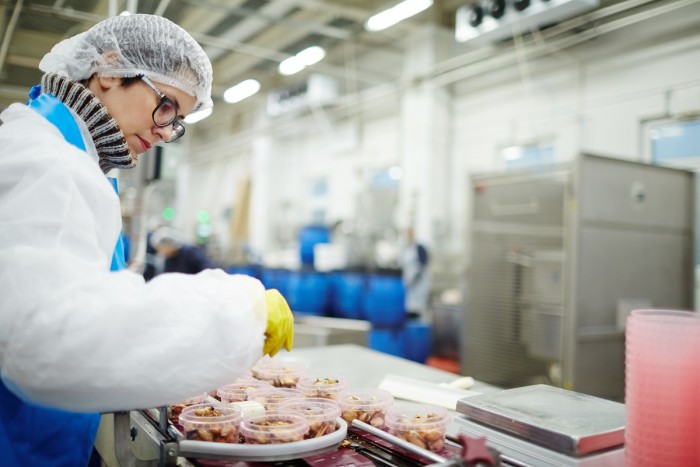Food and Beverage Factory Worker
Kaimahi Tohitū Whakanao Kai/Inu
Alternative titles for this job
Food and beverage factory workers prepare ingredients, operate machinery, and bottle or package food and drink.
Pay
Food and beverage factory workers usually earn
$24-$25 per hour
Source: PayScale and Trade Me Jobs, 2018.
Job opportunities
Pay
Pay for food and beverage factory workers varies depending on experience.
- Food and beverage factory workers usually start on the minimum wage.
- Food and beverage factory supervisors can earn $25 an hour.
Sources: PayScale, 2018; and Trade Me Jobs, 2018.
- PAYE.net.nz website – use this calculator to convert pay and salary information
- Employment New Zealand website - information about minimum wage rates
(This information is a guide only. Find out more about the sources of our pay information)
What you will do
Food and beverage factory workers may do some or all of the following:
- measure, mix and cook ingredients
- peel and slice food
- control the temperature and automated processes for making products
- check the quality of the product and record results during the production process
- operate and maintain machines
- inspect and pack the final product
- clean and sterilise the factory processing area.
Skills and knowledge
Food and beverage factory workers need to have knowledge of:
- the product being made or processed
- safety and hygiene regulations
- practical skills to operate machinery.
Working conditions
Food and beverage factory workers:
- may work overtime and do shift work
- work in factories
- usually work on their feet, and in conditions that may be noisy, wet, slippery, hot or cold.
Entry requirements
There are no specific requirements to become a food and beverage factory worker. However, some employers may require you to have a driver's licence and pass a pre-employment drug test.
Food and beverage factory workers may complete a New Zealand Certificate in Food and Beverage Processing (Level 2 or 3) while working.
Secondary education
There are no specific secondary education requirements to become a food and beverage factory worker. However, English, maths and processing technologies are useful.
Personal requirements
Food and beverage factory workers need to be:
- accurate and careful, with good attention to detail
- able to work at a fast pace
- good at maths
- responsible and able to make good judgements
- honest
- good team workers
- good at communicating
- able to follow instructions.
Useful experience
Useful experience for food and beverage factory workers includes:
- supermarket and restaurant work
- factory work
- bakery work
- brewery work
- manufacturing work.
Physical requirements
Food and beverage factory workers need to be reasonably fit and strong as they can spend long periods on their feet and may need to do heavy lifting.
A high standard of personal cleanliness and good hand-eye co-ordination are also important.
Find out more about training
- Competenz
- 0800 526 1800 - www.competenz.org.nz
What are the chances of getting a job?
Food and beverage factory work popular
Job opportunities for food and beverage factory workers are average.
There has been an increase in vacancies over the last five years due to higher demand for food and beverages locally and for export. However, vacancies fill quickly because the flexible working hours and low entry requirements make it a popular job.
There are more opportunities for food and beverage factory workers in Auckland, the Bay of Plenty, Canterbury, Hawke's Bay and Waikato.
According to the Census, 3,147 food and beverage factory workers worked in New Zealand in 2018.
Seasonal opportunities for food and beverage factory workers
Food and beverage factories often employ more staff over spring and summer so your chances of securing a job are better then.
Hospitality experience increases job chances
Experience handling food and drink in fast food restaurants or cafes and cleaning work in the hospitality industry both improve your chances of employment.
Types of employers varied
Food and beverage factory workers may work in:
- breweries and vineyards
- small businesses
- small or large factories
- large bakeries
- milk processing factories (dairies)
- flour processing plants (mills).
Sources
- Competenz website, accessed September 2018, (www.competenz.org.nz).
- John, S, HR business partner, The Kraft Heinz Company, careers.govt.nz interview, September 2018.
- Ministry of Business, Innovation and Employment, 'Beyond Commodities: Manufacturing in the Future 2018', 2018,(www.mbie.govt.nz).
- Ministry of Business, Innovation and Employment, 'Investors Guide to the New Zealand Beverages Industry 2017', June 2017, (www.mbie.govt.nz).
- Ministry of Primary Industries, 'Situation and Outlook for Primary Industries March 2017', March 2017, (www.mpi.govt.nz).
- Stats NZ, '2018 Census Data', 2019.
(This information is a guide only. Find out more about the sources of our job opportunities information)
Progression and specialisations
Food and beverage factory workers may progress into supervisory roles on the factory floor or move into management roles such as production manager.
Food and beverage factory workers may specialise in:
- blending drinks
- packing
- machine setting
- brewing beer
- bottling wine
- milling flour
- quality control.
Last updated 28 March 2025

